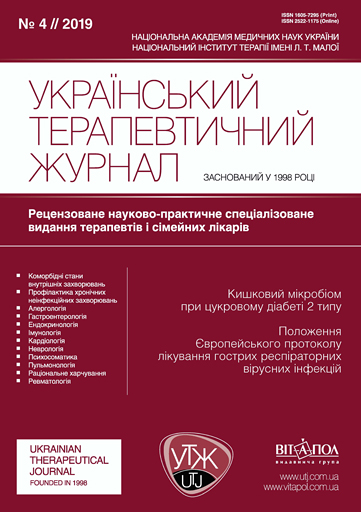Асоціація поліморфізмів генів β-адренорецепції з перебігом серцевої недостатності
DOI:
https://doi.org/10.30978/UTJ2019-4-41Ключові слова:
β1-адренорецептори, β2-адренорецептори, G-протеїн, серцева недостатність, поліморфізм, ген, ризик, перебіг захворюванняАнотація
Мета роботи — вивчити взаємозв’язок поліморфізмів генів β-адренорецепції з перебігом серцевої недостатності (СН).Матеріали та методи. У дослідження залучили 285 пацієнтів із СН на тлі післяінфарктного кардіосклерозу. Проводилось генотипування за 4 поліморфізмами (Gly389Arg гена β1-адренорецепторів, Ser49Gly гена β1-адренорецепторів, Gln27Glu гена β2-адренорецепторів та Ser275 гена β3-субодиниці G-протеїну) за допомогою полімеразно-ланцюгової реакції. За 2 роки спостереження з 285 хворих на СН 81 (28,4 %) мав повторну госпіталізацію чи амбулаторне внутрішньовенне застосування петлевих діуретиків у зв’язку з декомпенсацією патології.
За вказаний період померли 18 хворих (6,3 %). Комбіновану кінцеву точку мали 93 пацієнти (32,6 %). Генетико-епідеміологічний аналіз здійснювався за допомогою програми SNPStats.
Результати та обговорення. Алель А поліморфізму Ser49Gly (c.145A > G) гена β1-адренорецепції асоційований зі зниженням ризику комбінованої кінцевої точки у хворих на СН (відношення шансів (ВШ) = 0,52 (0,28—0,96); р = 0,032, домінантна модель та ВШ = 0,51 (0,28—0,92); р = 0,02, у лог-адитивній моделі спадковості). Даний алель поліморфізму Ser49Gly (c.145A > G) гена β1-АР також асоційований зі зниженням частоти повторної госпіталізації (ВШ = 0,50 (0,26—0,95); р = 0,028, домінантна модель спадковості та ВШ = 0,49 (0,26—0,92); р = 0,019, у лог-адитивній моделі). Алель G поліморфізму Gln27Glu (c.79C > G) гена β2-АР підвищує ризик комбінованої кінцевої точки у хворих на СН (ВШ = 1,76 (1,04—2,96); р = 0,032, домінантна модель спадковості та ВШ = 1,75 (1,06—2,90); р = 0,029, у наддомінантній моделі). Не виявлено достовірного впливу поліморфізму Gly389Arg (c.1165G > C) гена β1-АР та поліморфізму Ser275 (c.79C > G) гена GNβ3 на особливості перебігу СН.
Висновки. Отримані результати дозволяють зробити висновок про те, що особливості перебігу серцевої недостатності можуть мати асоціацію з генетичними відмінностями в шляхах β-адренорецепції.
Посилання
Georgievskii AB. K istorii zakona Khardi—Veinberga. Istorikobiologicheskie issledovaniya. 2011;3(1):6375 (Rus.).
S'omchenko VV, Ruban AA. Analіz vnutrіshn'ogo ta zovnіshn'ogo mіgratsіinogo rukhu naselennya Ukraїni. Ekonomіka і suspіl'stvo. 2018; 16: 959964 (Ukr.).
Akhter S, D'souza K, Petrashevskaya N. et al. Myocardial beta1adrenergic receptor polymorphisms affect functional recovery after ischemic injury. Am J Physiol Heart Circ Physiol. 2006;290:H1427H1432.
Aquilante CL, Yarandi NH, Cavallari LH, et al. β Adrenergic receptor gene polymorphisms and hemodynamic response to dobutamine during dobutamine stress echocardiography. The Pharmacogenomics J. 2008;8:408415. doi:10.1038/sj.tpj.6500490.
Chemello D, Rohde LE, Santos, et al. Genetic polymorphisms of the adrenergic system and implantable cardioverterdefibrillator therapies in patients with heart failure. Europace. 2010;12:686691. doi:10.1093/ europace/euq040.
Covolo L, Gelatti U, Metra M, et al. Role of beta1 and beta2adrenoceptor polymorphisms in heart failure: a casecontrol study. Eur Heart J. 2004;25:1534–1541. doi:10.1016/ j.ehj.2004. 06.015.
Levin M, Marullo S, Muntaner O, et al. The myocardium protective Gly 49 variant of the beta1 adrenergic receptor exhibits of constitutive activity and increased desensitization and down regulation. J Biol Chemistry. 2002;277:3042930435. doi:10.1074/jbc.M200681200.
Matkovich SJ, van Booven DJ, Hindes A, et al. Cardiac signaling genes exhibit unexpected sequence diversity in sporadic cardiomyopathy, revealing HSPB7 polymorphisms associated with disease. J Clin Invest. 2010;120:280289. doi:10.1172/ jci39085.
McNamara DM, Taylor AL, Tam SW, et al. Gprotein beta3 subunit genotype predicts enhanced benefit of fixeddose isosorbide dinitrate and hydralazine: results of AHeFT. JACC Heart Fail. 2014;2:551557. doi:10.1016/j. jchf.2014.04.016.
Metaxa S, Missouris C, Mavrogianni D. et al. Polymorphism Gln27Glu of β2 adrenergic receptors in patients with ischaemic cardiomyopathy. Curr Vasc Pharmacol. 2018;16(6):618623. doi:10.2174/ 1570161115666170919180959.
Metrich M, Mehmeti F, Feliciano H, et al. Adrenergic Receptor Polymorphism and Maximal Exercise Capacity after Orthotopic Heart Transplantation PLOS One. 2016;11(9):e0163475. doi:10.1371 /journal.pone.0163475.
Naga Prasad SV, Nienaber J, Rockman HA. Betaadrenergic axis and heart disease. Trends Genet. 2001;17:4449.
Panebra A, Wang WC, Malone MM, et al. Common ADRB2 haplotypes derived from 26 polymorphic sites direct beta2adrenergic receptor expression and regulation phenotypes. PLoS One. 2010;29:e11819. doi:10.1371/journal.pone.0011819.
Ponikowski P, Voors A, Anker D,et al. ESC. Guidelines for the diagnosis and treatment of acute and chronic heart failure 2016. The Task Force for the diagnosis and treatment of acute and chronic heart failure of the European Society of Cardiology (ESC) Developed with the special contribution of the Heart Failure Association (HFA) of the ESC. Eur Heart J. 2016;8:123. doi:10. 1093/ eurheartj/ ehw128.
Ranade K, Jorgenson E, Sheu W, et al. A polymorphism in the b1 adrenergic receptor is associated with resting heart rate. Am J Hum Genet. 2002;70:935942. doi:10.1086/339621.
Rathz DA, Brown KM, Kramer LA, et al. Amino acid 49 polymorphisms of the human beta1 adrenergic receptor affect agonist promoted trafficking. J Cardiovasc Pharmacol. 2002;39:155160. doi:10.1097/0000534420020200000001.
Schmitz B, De Maria R, Gatsios D, et al. Identification of genetic markers for treatment success in heart failure patients: insight from cardiac resynchronization therapy. Circ Cardiovasc Genet. 2014;7:760–770. doi:10.1161/ CIRCGENETICS.113.000384.
Sheppard R, Hsich E, Damp J, et al. (2016) Investigators GNB3 C825T Polymorphism and Myocardial Recovery in Peripartum Cardiomyopathy Results of the Multicenter Investigations of PregnancyAssociated Cardiomyopathy Study. Circ Heart Fail. 2016;9:e002683. doi:10.1161/CIRCHEARTFAILURE.115.002683.
Xiao RP. Betaadrenergic signaling in the heart: dual coupling of the beta2adrenergic receptor to G(s) and G(i) proteins. Sci STKE. 2001;104:RE15. doi:10.1126/stke.2001.104.re15.





